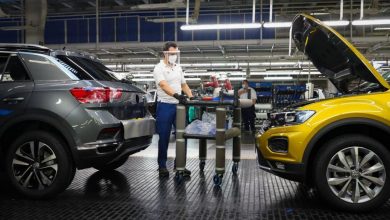Automotive Industry: China Emerging from COVID-19 Shock
With China now gradually emerging from the Covid-19 crisis, Chinese market demand for automobiles is starting to improve. Also in play are expectations that auto demand stimulus policies will be announced at the National Congress. But, due to a prolonged gap in production in major global manufacturing centers (excluding China), global auto industry/supply chain uncertainties are likely to linger.
Chinese car sales drop 40.3% y-y in March; Tesla successfully enters market
In March, Chinese auto sales totaled 1.05mn units (-40.3% y-y). With China now gradually emerging from the Covid-19 crisis, the pace of decrease in demand (vs February) has slowed with the help of: 1) the extending of Chinese government support for xEV subsidies; and 2) measures to promote auto demand, including Beijing’s incentives to trade in older automobiles.
In March, xEV (EV/PHEV) sales fell to about 56,000 units (-47.5% y-y), with the related share of China’s overall automobile market falling to 5.3% (vs 6.0% in Mar 2019 and 5.7% in Feb 2020).
Sales of the Tesla Model 3 (began selling in Jan 2020) continued to improve, reaching 10,160 units in March (vs 3,900 units in February; M/S of 18.3% in March). Although uncertainties stemming from the Covid-19 crisis remain in play, we believe that expectations towards long-term growth in China’s EV market remain valid, noting: 1) a two-year extension in the Chinese government’s EV subsidy; 2) the start of full-scale operations at Tesla’s Shanghai plant; and 3) a NEV credit quota upgrade (2019: 10% → 2020: 12%).
China gradually emerging from Covid-19 shock
In March, Hyundai Motor Co. (HMC) and Kia Motors sold 35,000 units (-22.2% y-y) and 13,537 units (-38.5% y-y), respectively, in China, with ex-factory sales for the two firms amounting to 30,838 units (-49.7% y-y) and 16,946 units (-45.9% y-y), respectively. Both players have resumed active promotional activities, including the launches of new car exchange offers and various customer care programs (including, for example, unemployment protection plans).
With China gradually emerging from the Covid-19 shock, auto stocks around the world are starting to rebound in line with easing concerns towards financial markets. That said, due to a prolonged period of discontinued production in major global manufacturing areas (excluding China), including in the US and Europe, global auto industry/supply chain uncertainties are to linger for now.
Font: Business Korea





